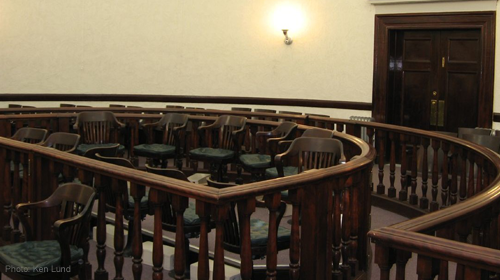
Picture a death row trial in Alabama. The twelve jury members have spent days, maybe even weeks, listening to testimony and evidence about the crime, the defendant, and his life. They are sent back to a room to make the difficult decision whether the defendant should be sentenced to die or serve life without parole. In Mario Woodward's case,after deliberation, the jury voted 8 to 4 that he should be imprisoned instead of put to death.
Their votes should have counted, but instead Mr. Woodward ended up on death row.
In any other state, the jury's decision would be final. Alabama is one of three remaining states in which the judge can ignore the jury and have the final say about whether a defendant will live or die. This practice might still be on the books in Delaware and Florida, but only in Alabama do judges continue to override life verdicts for death - even in cases where the jury's vote for life was unanimous. In recent years, Alabama judges have overridden the jury 95 times to impose death when the jury chose life without parole. This unfair and unique practice violates the constitution, and is one of the many ways that the death penalty is broken.
And yesterday, the Supreme Court decided, in effect, to keep it that way. By refusing to hear the case of Woodward v. Alabama, the Supreme Court left unsettled the question of whether judicial override in death penalty cases violates the Eighth Amendment.
Two Justices were not pleased. Justice Sonia Sotomayor, partly joined by Justice Stephen Breyer, thought the Court should have considered the case. She wrote to explain her "deep concerns that about whether this practice offends the Sixth and Eighth Amendments," and described some of many failures of Alabama's override experiment. The explanation for why Alabama alone today uses this uniquely unfair practice, she wrote, "Alabama judges, who are elected in partisan proceedings, appear to have succumbed to electoral pressures." Sotomayor recounted many examples where elected judges actually campaigned on their override votes. This evidence, in her view, "casts a cloud of illegitimacy over the criminal justice system."
Race also appears to play a role in whether the judge will honor the jury's life recommendation: a survey of override verdicts by the Equal Justice Initiative found that 75% of all life to death overrides in Alabama involved white victims. This includes African- American ACLU client, Montez Spradley, who was later found to be innocent of murder, but was first sentenced to death by a trial judge after the jury had voted overwhelmingly for life.
The Supreme Court last considered Alabama's override system nearly 20 years ago, in the case of Harris v. Alabama, when other states still retained some form of override. Since then, as other states have recognized the errors plaguing such a system, Alabama has become an outlier. Its override system has shown that death sentences aren't meted out after a carefully-considered decision by twelve members of the community but at the whim of elected judges. While the Court passed on the opportunity to shut down the practice today, let's hope that Justice Sotomayor's dissent paves the way for the Court to find override unconstitutional one day soon. It is long overdue.
Learn more about the death penalty and other civil liberty issues: Sign up for breaking news alerts, follow us on Twitter, and like us on Facebook.


